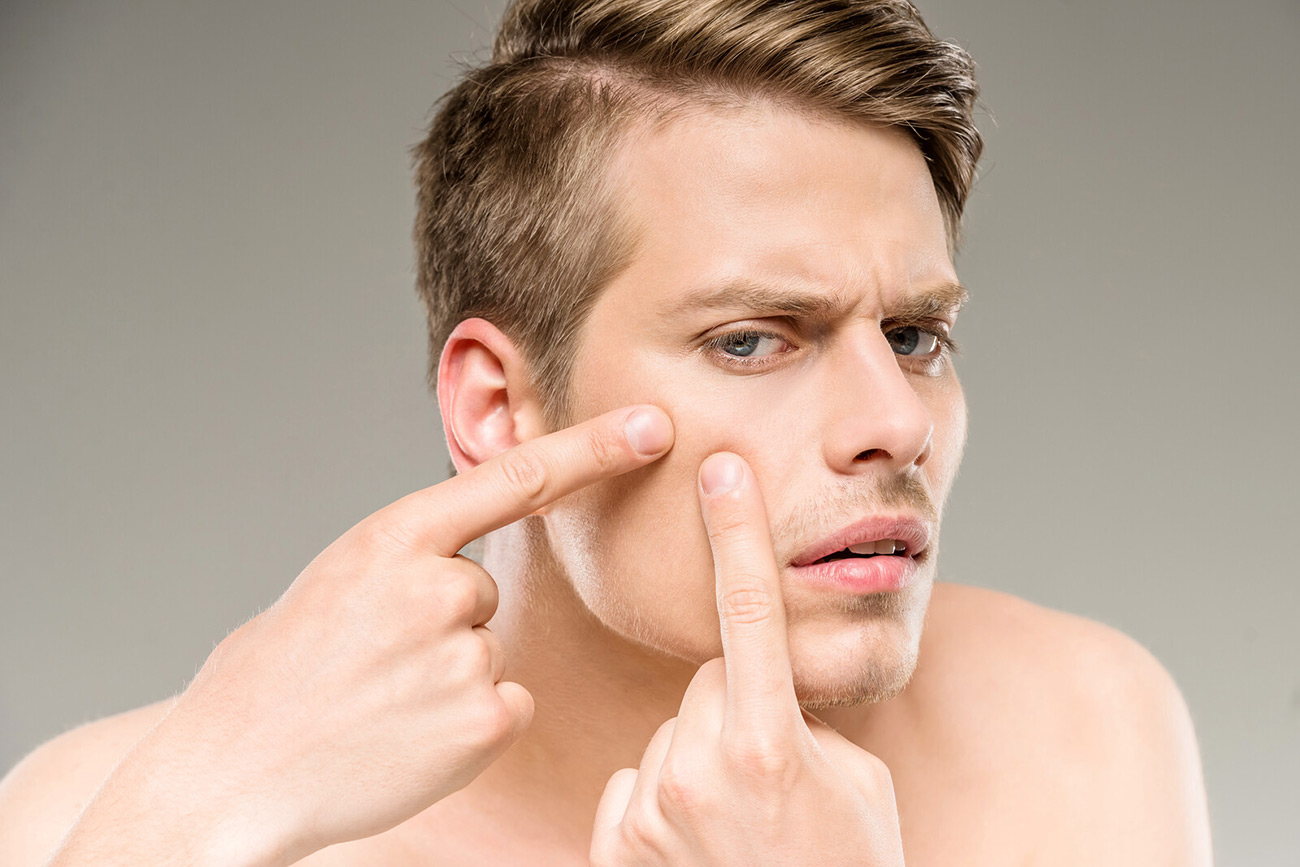Table of contents
Most people experience acne at some point in their life, especially in their teenage years. Acne, zits, or pimples are usually associated with hormonal changes that come with puberty. However, this particular skin problem sometimes extends to adulthood and can be very annoying to deal with.
According to health research organization National Institutes of Health, acne commonly occurs when hair follicles under the skin become clogged with sebum (oil) and dead skin cells. This mixture encourages bacteria growth that plugs follicles – eventually breaking down and forming a lesion. For adult men, this is the usual cause of acne, with additional indirect factors that may trigger acne, such as:
- Hormonal changes: An increase in male sex hormones, such as androgen, can trigger the production of more sebum leading to more acne. Both physical and emotional stress can also indirectly affect your hormonal balance.
- Diet: A systematic review on “Diet and Acne” suggests that glycemic and dairy-heavy diets can cause acne to develop.
- Medications: There are some medications that contain hormones, corticosteroids, or lithium that may trigger acne inflammation.

© Can Stock Photo / VadimGuzhva
How can you deal with acne?
To deal with acne, you need to take good care of your skin. So it’s worth considering the following tips below to help ward off blemishes:
Consult with a medical professional
The best way to find the most optimal treatments or products for your skin condition is by consulting with a professional, and the health provider doesn’t necessarily have to be a board-certified dermatologist either. A study by the American Association of Nurse Practitioners states that the quality of services provided by nurse practitioners (NP) is as good as board-certified physicians. If you’re having trouble finding a dermatologist in your area, you can consider consulting with one online.
The remote nurse practitioners jobs on Wheel show how dermatology NPs have to undergo long training to treat issues like acne effectively, even when done remotely. Aside from studying in an advanced nursing practice program, many remote dermatology NPs take on extra training to provide expert and specialized patient care over telemedicine platforms. When choosing to consult a physician online, make sure to explain your skin condition and prepare well-lit pictures so your healthcare provider can recommend the best treatments for you.
Take certain medications
Several over-the-counter products can help you treat your acne. In the case of topical medicine, you can use benzoyl peroxide gels, lotions, or a facial wash to help kill bacteria. Aside from OTC medicine, you can get prescriptions for stubborn acne like topical tretinoin and tetracycline antibiotics.
However it’s important to remember that they are prescription-only, so you would need to consult with a professional on what works for you. Moreover, it’s important to remember these medicines aren’t miracle products. It can take weeks or months before you see any positive effects.
You may also like “Kiehl’s Rare Earth Deep Pore Cleansing mask: deep cleanse your skin”
Follow a skincare regimen
When it comes to men, Korean actors and pop idols have great skin — owing to the country’s thriving skincare culture. There are many high-quality skin products available on the market now, and if you’re not sure where to start, our post on “Korean Skincare Techniques for Men” can guide you with the essential tools.
Be mindful of how sensitive your skin is as some products like acne facial washes contain salicylic acid and other actives, which may cause dryness or peeling. It’s good to read reviews from people with similar skin types: whether it is oily, normal, combination, or dry. Once you find something that works, you can incorporate it into a consistent regimen for smoother, clearer skin.
Be careful when shaving
Acne can get worse after shaving and that can make things difficult, not to mention painful. Never shave off the top of a pimple – it’ll just open your skin up to infection and possible scarring. You can also opt to switch to an electric razor if the one you currently use is irritating your skin.
Take note that for some men, there may be facial bumps that feel like acne, but this could actually be inflammation caused by ingrowing hairs or folliculitis instead. Men with curly hair tend to be more prone to folliculitis as the hair curls under the skin, so letting it grow a bit longer before shaving can help.
With the aforementioned tips at hand, you can treat and even prevent acne from appearing. Remember, consistency is the key when it comes to good skin.
